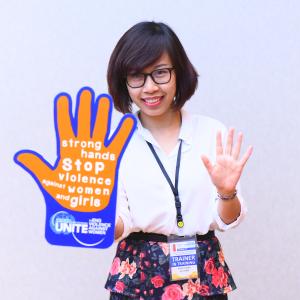Promoting Media Literacy for Gender Equality in ASEAN
21 October 2018
- Ha Noi, 21 October 2018 - ASEAN, together with UN Women, held a seminar on Gender and Media Literacy. This is one of a series of events leading up to the ASEAN Ministerial Meeting on Women which will be held later this week.
Gender biases and stereotypes have permeated all forms of media in ASEAN. Women remain underrepresented in the media and are often portrayed in stereotypical roles. Of concern is the normalization of violence against women on television and other media. The media heavily influences social perceptions, with young boys and girls internalizing gender biases. Constant exposure to gender stereotypes desensitizes the public and renders them immune to gender inequality and discrimination.
With 74 per cent of the total ASEAN population now have access to the internet through mobile phones, there is an urgent need to promote media literacy among media users and producers, and address the damaging depictions of women and girls.
"Depictions of relationships between men and women emphasize traditional roles and normalize violence against women. At the same time it's also through media that prejudices, stereotypes, perceptions on gender can be challenged and transformed." – Elisa Fernandez, Head of UN Women Viet Nam, shared in her opening speech.
The seminar focused on raising understanding and awareness of media practitioners on gender equality. It brought together government representatives media practitioners, youth and change makers, civil society organisations and other stakeholders to exchange insights and perspectives on how to promote gender sensitive media. Participants explored ways on how media literacy can contribute to combatting harmful depictions of women and girls and to transforming gender relations in the ASEAN context.
"The media plays an important role in addressing gender inequality", said His Excellency, Dr. Kung Phoak, Deputy Secretary-General for the ASEAN Socio-Cultural Community. "It is important that women are portrayed positively in the media and young girls are able to see themselves as powerful agents of change, instead of passive bystanders. More importantly, it is important that young boys are able to see women as equal partners, capable of leading", he added.
Mr. Nguyen Manh Cuong, Director General. International Cooperation Department, MOLISA noted that "The inclusion of men and boys as agents of change in addressing gender stereotypes, remains a crucial factor in the struggle for gender equality".
This seminar works towards fulfilling the ASEAN Committee on Women (ACW)'s objective on raising understanding and awareness of media practitioners on gender equality. Promoting gender equality goes beyond the bodies dealing with women's issues. The ACW remains committed to mainstream gender equality in other ASEAN bodies of ASEAN especially the bodies working on media, information, culture and art such as the ASEAN Senior Officials Responsible for Information (SOMRI) and the ASEAN Senior Officials on Culture and Art (SOMCA).


